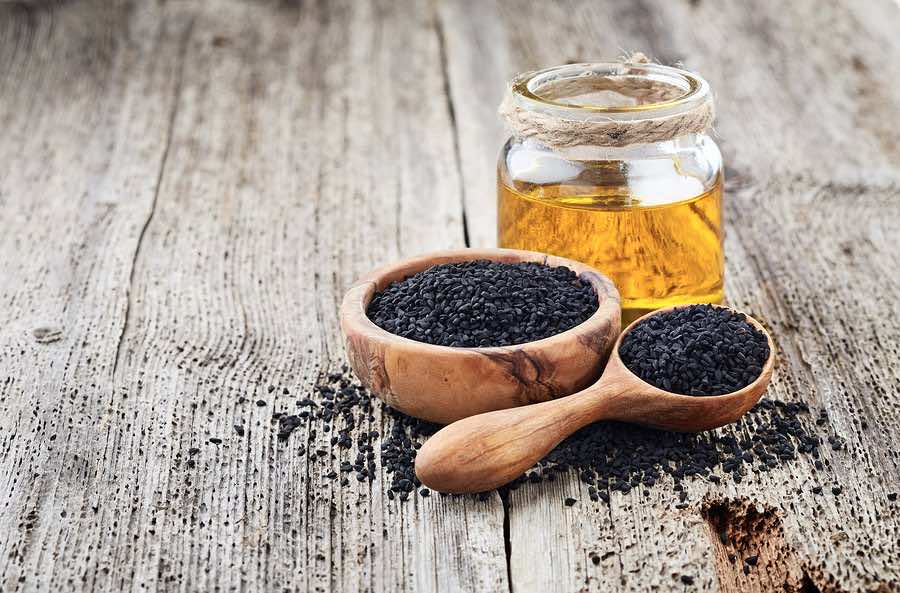
Why You MUST Get Black Seed Oil Into Your Diet Today


Why You MUST Get Black Seed Oil Into Your Diet Today

Research backs this up. High-fat diets are well-known to provide many health benefits, including reducing your risk factor for disease, lowering your chances of getting diabetes (1), and helping you control diabetes, just a few benefits.
But, you do need to choose your fat intake wisely. If you load up on deep-fried foods rich in saturated fat or frozen pastries that contain high levels of trans fats, healthy is not something you will be.
This is why taking the time to plan out your diet is key. One dietary fat we see offers tremendous health benefits you should take advantage of is black seed oil. This oil is one that many people often overlook for other oil varieties, such as olive oil, coconut oil, or even sesame seed oil. While those are all certainly healthy in their own right, there should be room for one more oil in your diet. By alternating between all these healthy oils, you’ll get the best benefits possible from your food intake.
Let me share with you right now why black seed oil is a must, in my opinion, to include in your diet plan.
What Is Black Seed Oil
Before diving too deep into black seed oil’s benefits, let’s first define this oil. This oil comes from the seeds of black cumin, which is unrelated to the cumin you may know that makes up turmeric. These are two entirely different seeds, so don’t get those two confused.
Black cumin is a plant that grows in southwestern Asia, the Mediterranean, and Africa and has been used for many years as a herbal medicine.
Black seed is not black pepper, sesame, or cohosh, so be sure you are not confused. Those, too, are entirely different and will offer unique benefits.
Black seed contains three key compounds which help to benefit the body so greatly. These are thymoquinone (TQ), thymohydroquinone (THQ), and thymol. Together they work towards helping you be the healthiest you can be.
Helps To Combat Superbugs

Approximately 5-10% of all patients admitted to the hospital develop some degree of infection from what’s referred to as superbugs. These people typically have to undergo longer hospital stays and require more intense treatments to recover; some don’t recover as well, either.
More than 90,000 patients die annually from infection from these superbugs, which are incredibly hard to treat. Some infections they can cause include HIV, staphylococcal, tuberculosis, influenza, gonorrhea, candida, and malaria. Likely you’ve heard of all of these before.
The good news is the black seed is proving to provide a significant benefit to helping treat these superbugs, allowing patients to potentially recover quicker than if they had just used conventional medicine (2). For this reason, black seed oil is quickly becoming one of the most talked about natural treatments.
A Treatment For Cancer
Another benefit of black seed is its powerful phytochemical and antioxidant capabilities. Research that has been done on black seed has shown that patients who are using it have noted a 52% decline in tumor cells, so this is one oil that they may want to start using immediately.
This is thanks to the thymoquinone compound, which helps promote apoptosis, where the cancer cells kill themselves directly. It’s been shown beneficial in leukemia cells (3), breast cancer cells, and brain cancer cells.
Likewise, it may also help to inhibit pancreatic cancer, and it does this through its anti-inflammatory properties (4).
All of the research being done in this area right now is giving strong hope to the medical community that black seed oil may be one of the best natural treatments yet in the case of cancer.
Enhanced Liver Health

Another area where we can expect to see benefits from using black seed oil is liver health. Your liver is an incredibly important organ in the body and is responsible for helping detoxify the blood and ensure that you are excreting waste as you should.
There isn’t a single toxin that isn’t processed by the liver, so it has much to bear as it functions daily. On top of this, your liver is also where bile is produced, which is necessary for the proper breakdown and utilization of fat in the body.
Sadly, not everyone’s liver is functioning as it should. Many things you do on a day-to-day basis do impact your liver health, and this can make it less capable of handling these important life-saving tasks.
For those dealing with poor liver function, whether due to alcohol consumption or disease states, black seed oil is beneficial. It may help rejuvenate the liver, providing strong healing benefits that help restore its functioning as it should (5).
Black seed oil can also be a preventative treatment, so if you want to maintain your liver’s health as best as possible, consider adding it to your day. This way, your liver will hopefully never be in a position where it cannot filter out those toxins as it should.
Supports Those Struggling With Diabetes
Rates of diabetes are now on the rise, and we see more and more people fall prey to this illness every day. Due to our changing lifestyles, which involve us consuming an ever-increasing intake of processed and fast foods, many of which contain very little nutrition and leave our blood glucose levels skyrocketing.
Simply going on a lower-carb, higher-fat diet can be helpful in the treatment of diabetes because, unlike carbohydrates, dietary fat helps stabilize blood glucose levels. You won’t get those blood glucose spikes you get with carbohydrates after eating a meal rich in fat.
You need to be careful not to eat too much fat so that you start experiencing rapid weight gain. If you do that, you may be left with a situation where you are at risk of diabetes due to a higher body fat percentage.
Balance is key, like all things in life.
But of all the fat you take in, you’ll want to ensure some comes from black seed oil.
Research published in the Journal of Endocrinology and Metabolism has noted that black seed oil helps to combat diabetes by helping with the regeneration of the pancreatic beta-cells and may also help to lower the serum insulin concentrations and decreases the elevated serum glucose present (6).
What’s unique about this is that you may be able to help treat both type 1 and type 2 diabetes with black seed oil, which is a rare find. Most natural treatments we see today help treat type 2 diabetes, but not type 1. This is revolutionizing the diabetes world.
Some researchers have said that black seed oil may be as effective for improving glucose tolerance as metformin, which is a drug that is heavily prescribed for diabetic patients by doctors. The good thing is that while metformin often comes with a whole long list of side effects, the patient then has to endure, such as bloating, constipation, heartburn, headaches, muscle and stomach pain, and indigestion troubles, black seed oil doesn’t have any unwanted side effects when used as it should be (and the calories accounted for).
Assists In Weight Loss Results

According to the CDC, 32.2% of all men and 35.5% of all women are classified as obese in today’s world. So anything we can do to help end obesity is very good. Black seed oil may provide some benefits.
Researchers are now looking at how some plants may provide anti-obesity benefits, to the point that if subjects eat these plants regularly, it may help to ward off weight gain (7). Black seed oil is one of these plants.
The reason behind this is not fully apparent yet, but research shows a correlation between those who consume black seed oil and their overall body mass index. It would appear that those who use it regularly in their diet possess a lower body mass index and a waist circumference, which gives researchers reason to believe that it may help with fending off diabetes quite well.
It should be understood, however, that this oil will not work miracles. You can’t add it to your diet, do everything else the same, and expect to lose weight. Doing so may cause you to gain weight because the supplement will contain calories.
So first, it needs to be worked into your diet in a way that it’s replacing calories, not adding calories, and second, you do still need to be following a calorie-reduced diet to see benefits.
Helps Improve Skin Health
If you’re one of the unfortunate people suffering from eczema, you might find that black seed oil can help relieve some. Typically patients who suffer from this condition are prescribed Betamethasone to help manage the discomfort and clear up the rash; however, this often comes with many unwanted side effects.
These include things like swelling in your face or hands, tingling in the mouth, a feeling of tightness in the chest, difficulty breathing, skin color changes, dark freckles, and muscle weakness. Some people notice weight gain resulting from Betamethasone, which presents many other problems.
So you are trading one problem for another, so to speak. The good news, however, is that black seed oil doesn’t come with all these negative side effects, so it’s a much healthier choice for those dealing with this issue.
Along with using black seed oil, also be sure to check out a good probiotic product such as Probiotic Breakthrough, which can also help to promote clearer, healthier-looking skin.
Enhance Hair Health

Dreaming of luscious locks? If so, you may want to add black seed oil to your list of foods to consume in your diet plan. Note that this implies eating it directly or putting it straight onto the hair and scalp. Both will offer benefits, so utilize these strategies to improve your hair from the inside out.
It can help improve hair health because it is an antihistamine and may also help assist those experiencing hair loss due to androgenic alopecia or alopecia areata.
On top of that, those who use it regularly may also report experiencing less dandruff and dryness in the hair, resulting in less breakage and healthier-looking, stronger hair altogether.
So as you can see, getting black seed oil in your diet plan today has plenty of great benefits. Because it is an oil, there are many different ways it can be worked into your diet, so this isn’t a food that you should struggle to take in. It does have a rather strong bitter taste to it, so keep that in mind. Additionally, it’s best used when eaten raw as this helps preserve all the health benefits, so consider mixing it with other ingredients and using it as a salad dressing.
Also, like all herbal treatments, black seed oil can interfere with some medications. So please speak with your doctor before treating yourself with it, provided you plan to use it daily. Finally, it may cause blood clotting to slow down, so those receiving any treatments for blood clots should speak with their physician before proceeding.
Frequently Asked Questions
1. What is black seed oil, and what does it do for you?
Black seed oil is a naturally occurring oil that can be used through consumption or applied topically. It may help to reduce the spread of cancer, combat diabetes, lower body weight, and improve hair and skin health to name just a few of the key benefits.
2. Can black seed oil regrow hair?
Black seed oil may help with regrowing hair in thinner areas of your scalp if you suffer from alopecia. It may also help to prevent hair breakage, which will help hair look thicker over time as you will retain more of your natural hair rather than see it break off.
3. Can you lose weight by taking black seed oil?
Black seed oil appears to have a connection to weight loss, as those using it often report lower BMI values than those who aren’t using it. Remember, though, that because it contains calories, you’ll want to be careful with how much you take in.
4. Is black seed oil safe to use?
For most people, it is. It can slow blood clotting, however, so if you are already experiencing treatment for blood clotting reasons, proceed with caution and speak to your doctor before using it.
Frequently Asked Questions
References:
1. Parillo, M. et al. “A high-monounsaturated-fat/low-carbohydrate diet improves peripheral insulin sensitivity in non-insulin-dependent diabetic patients.” Metabolism 41.12 (1992): 1373-1378.
2. Salman, Mohd Tariq, Rahat Ali Khan, and Indu Shukla. “Antimicrobial activity of Nigella sativa Linn. seed oil against multi-drug resistant bacteria from clinical isolates.” (2008).
3. Salim, Landa Zeenelabdin Ali, et al. “Thymoquinone induces mitochondria-mediated apoptosis in acute lymphoblastic leukemia in vitro.” Molecules 18.9 (2013): 11219-11240.
4. Olive, Kenneth P., et al. “Inhibition of Hedgehog signaling enhances the delivery of chemotherapy in a mouse model of pancreatic cancer.” Science (2009).
5. Hamed, M. A., N. S. El-Rigal, and S. A. Ali. “Effects of black seed oil on the resolution of hepato-renal toxicity induced by bromobenzene in rats.” Eur Rev Med Pharmacol Sci 17.5 (2013): 569-581.
6. Mathur, Murli L., et al. “Antidiabetic properties of a spice plant Nigella sativa.” Journal of Endocrinology and Metabolism 1.1 (2011): 1-8.
7. Hasani-Ranjbar, Shirin, Zahra Jouyandeh, and Mohammad Abdollahi. “A systematic review of anti-obesity medicinal plants-an update.” Journal of Diabetes & Metabolic Disorders 12.1 (2013): 28.
